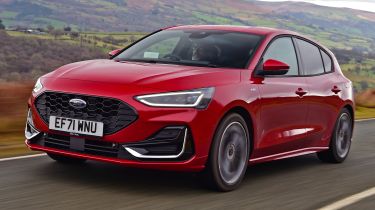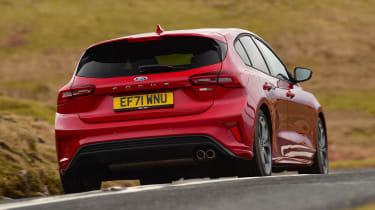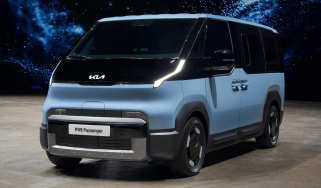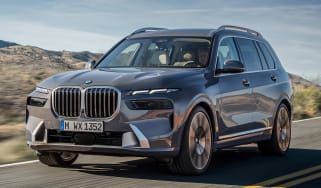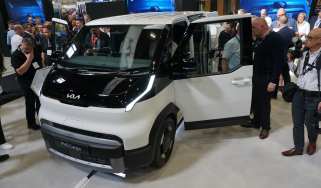Ford Focus review - Engines, performance and drive
Offering typically superb handling, the Focus is more fun than a family car has any right to be

The first thing to know is that the Focus gets a couple of different suspension configurations depending on which engine you choose. Get one with the 1.0-litre EcoBoost petrol or the now-discontinued 1.5-litre EcoBlue diesel engine and you’ll get relatively simple twist-beam rear suspension; go for the 2.0 diesel (also no longer offered on the price list) and your car will feature a multi-link set-up. Picking ST-Line or ST-Line X lowers the set-up by 10mm, incidentally, regardless of which suspension layout is at the back.
It shouldn’t bother you much anyway because, regardless of suspension layout, the Focus is the best-handling family car around. Start your journey in town and you’ll find the car quick to respond when you turn the wheel to cut through traffic. But this doesn’t mean it’s nervous at speed; there’s just about enough play off-centre for the car to remain composed on motorways. It’s comfortable, too, the primary and secondary rides working nicely to soften all but the very sharpest of jolts from the road.
And when you find a twistier bit of road, the Focus trots out its party piece. Don’t expect the steering to chat away to you all the time, but the electrically powered set-up goes down as one of the best we’ve experienced in a family hatch. Suffice it to say that you will very quickly learn to lean on the Focus’ front end.
Used - available now

2020 Ford
Focus
28,423 milesManualPetrol1.0L
Cash £11,850
2020 Ford
Focus
38,535 milesManualPetrol1.0L
Cash £10,599
2017 Ford
Focus
38,271 milesManualDiesel1.5L
Cash £8,999
2020 Ford
Focus
24,817 milesManualPetrol1.0L
Cash £12,403Of course, none of this front-end bite would matter if the rest of the package felt like it wasn’t playing its part in proceedings. There’s the faintest, fleeting feeling of weight transfer if you ask the Focus to change direction in a hurry, but it passes so quickly that it’s unlikely to ever be an issue. As a handling package, it’s extremely well-judged.
The standard six-speed manual gearbox is slick enough, although it does prefer a positive throw instead of tentative shifts. The eight-speed automatic, meanwhile, is not without the occasional glitch, but in general it’s a smooth enough performer. We still think that the VW Group’s dual-clutch DSG units are ever so slightly more polished than this torque converter auto, though.
0-62mph acceleration and top speed
The Mk4 Focus is only offered with petrol power now, but for a time it came with a mix of petrol and diesel engines. The core of the petrol range, badged EcoBoost, is a 1.0-litre three-cylinder engine that’s offered as a standard 123bhp unit, or with mild-hybrid assistance producing either 123bhp or 153bhp. 0-62mph is completed in 10.2s and 9.0s, respectively.
In the Focus mHEV, the turbocharged 1.0-litre three-cylinder EcoBoost petrol unit is linked to a belt driven starter-generator motor, with the aim of providing improved fuel economy and emissions. The 48-volt battery system can provide an extra 24Nm of torque when needed and reduce the load on the combustion motor. It also enables seamless engine shut-off and start up, with the driver able to choose when the new start-stop system kicks in to allow emissions free coasting; at 9mph, 12mph or 16mph.
We tested the most modest of the Focus diesels – the 118bhp 1.5-litre EcoBlue – before it was removed from the price list and feel it's a decent option if you know you’re going to rack up big mileages. It’s not quite as sweet and hushed as the EcoBoost when cruising along, but it maintains speed reasonably well.
The EcoBlue diesel engine performs reasonably well, although it does need revving to get the most out of it as there's not much torque below 2,000rpm, and this can be a little frustrating when pulling out of junctions or when overtaking. At least the six-speed manual gearbox has a positive shift to make life easier.
The ST model sits at the top of the range, fitted with a 276bhp 2.3-litre petrol engine which helps the hot hatch sprint from 0-62mph in 5.7s if get the six-speed manual version. Models fitted with the seven-speed automatic take 5.8 seconds to complete the same benchmark sprint.

